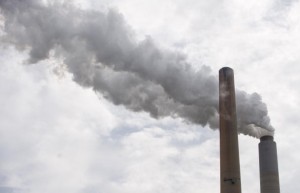Climate Deal Puts Spotlight on Carbon Capture Technology

Photo by SAUL LOEB/AFP/Getty Images
A new deal between the US and China would reduce carbon emissions from the two countries over the next several years.
The deal that the U.S. and China have struck to curb carbon emissions has been hailed as a breakthrough by many concerned with climate change, and panned by politicians opposed to President Obama. But it’s also captured the interest of a group of researchers — some in Texas — who specialize in carbon capture and sequestration technology.
The deal is short on specifics. But it commits the U.S. and China to continue investing in carbon capture, use and storage. That’s technology that filters CO2 from coal power plants and then pumps the carbon underground. Texas has been doing it for decades to get oil out of the ground in a process called enhanced oil recovery.
“It’s always poor form for Texas to do too much boasting, but the source of expertise for injecting CO2 for enhanced oil recovery lies mostly in Texas,” says Susan Hovorka, a senior researcher scientist at UT’s Bureau of Economic Geology, who works on carbon sequestration.
Hovorka expects the China/U.S. deal could reignite public interest in the technology. That may make more funding available for research. Though she says there’s nothing in the agreement that will bring the countries beyond the research and development phase. That would take public funding for widespread adoption of the technology.
“We are still waiting for a policy breakthrough that would incentivize going to the next step and moving from research and proof of concept into action,” says Hovorka.
It’s a view shared by others.
“The domestic commitment is still lacking, but the agreement with China would suggest that, as a research and development activity, we’re still committed to it,” says Gary Rochelle with UT’s Department of Chemical Engineering.
One of the research and development ventures in the deal commits the U.S. and China to a carbon capture project that would inject one million tons of carbon back into the ground. China pumps around 9 billion tons of CO2 into the atmosphere each year through energy use.
Despite the limited scope of the commitment to carbon capture, many believe the general commitment by China to limit carbon emissions could help efforts in the U.S. to create a more comprehensive response to climate change.
“One of the major political barriers to do anything in the U.S. is the valid argument that we could do anything we wanted to do and if China didn’t do anything, it wouldn’t matter,” says Rochelle. “This agreement at least establishes at a diplomatic level that China is willing and able and plans to do something and therefore we can move together on this.”